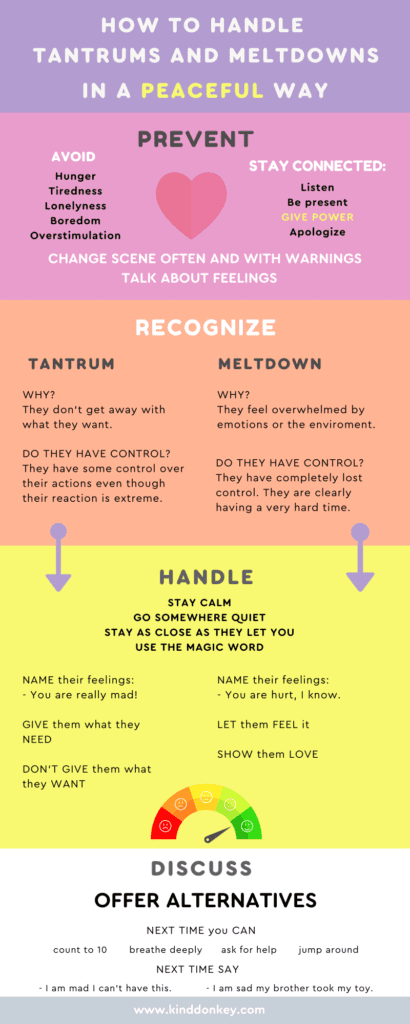
We want to learn how to handle a tantrum or meltdown. Having a plan for when they happen will make it much easier for you to handle them peacefully and effectively.
Toddler tantrums and meltdowns can test the patience of almost everyone. They are hard to understand, hard to prevent, and hard to handle. But they are necessary for the emotional growth of your toddler. They are fantastic teaching opportunities.
Tantrum vs meltdown
Tantrums and meltdowns look very similar: a screaming crying child having a hard time. It is difficult to distinguish between them even when it’s your child’s. But they are different, they happen for different reasons and you need to handle them differently.

What a tantrum is
Typically a tantrum happens because your child is not getting their way. They might want you to buy a toy, or keep playing in the playground forever or, you know, to run to a busy road. A tantrum is an emotional response to big feelings, usually anger or frustration.
When a child is having a tantrum, they want to gain some power and get a reaction from you, for example buying them the toy that they want. This doesn’t mean that they are actively trying to manipulate you, they don’t know any better. They are trying to see if and how they can get what they want.
It is a good thing that they are determined. Your job is to teach them what they can and can’t get away with and how to express those big feelings.
How to recognize a tantrum
When your toddler is having a tantrum, they seem to have some control over what they do. They are having extreme behavior, but they know what they are doing. You might catch them glancing at you to see if you are looking at them midst crying. If they can have a conversation with you between cries and kicks, they are having a tantrum.
What a meltdown is
A meltdown usually happens because your child is overwhelmed by emotions or stimuli. They might have had a very fun day and now they are sad because they know it’s time to go home. They might not recognize what they are feeling.
When they have big feelings that they don’t know how to handle, their brain gets completely flooded by these emotions. Their rational brain shuts off. It’s absolutely impossible to stop them by talking to them.
How to recognize a meltdown
The first time you watch your child’s meltdown you may think they hurt themselves and you didn’t notice. They’ll be devastated and lose control completely. Every little thing will upset them more. They’ll be unable to listen to what you are saying.
How to prevent tantrums and meltdowns
First of all, we all tend to have extreme emotional responses when we are in a bad mood. There are a few things that will make your child be in a bad mood:
- They’re hungry.
- They’re tired.
- They feel lonely.
- They’re bored.
- They’re overstimulated.
These things make adults cranky too, but we have the ability to recognize and handle these feelings.
If you as a parent can pay attention to your child’s needs so that they don’t end up being hungry, tired, lonely, bored, or overstimulated, you will avoid a lot of tantrums and meltdowns.
Stay connected with your children
Pay attention to them, listen to what they say, make them feel loved (notice is not the same as loving them), and ask them what they need.
They want some power, so Include them in decision-making when it’s appropriate. If you can, offer two choices you are happy to give them.
We are all willing to follow the lead of someone we respect and love and feel respected and loved by.
Don’t say no too often
Toddlers want to be independent, but they still don’t understand why they can’t have that toy or why it’s a bad idea to run into traffic.
These are both situations where you should say no to your child. But we sometimes forget to adapt to what our children need and end up saying no to them when we really don’t have to. If they insist on reading ten books before bed, you really don’t have to say no.
Hearing no all of the time from you is going to make your children feel disconnected, powerless, and frustrated.
Reduce uncomfortable situations
There are events and places where your toddler will most definitely have a hard time. Imagine being a small child in a wedding where there are no other kids, with noise and music and only grown-up food. Or spending the afternoon in a mall, following your parents around while being told “don’t touch this please”, and “No, we can’t buy this” all the time.
Sometimes we would all be better off skipping those kinds of things. Maybe go hiking instead of going to that acquaintance’s wedding. You may have had a great time at the mall by yourself, but you won’t if your children are having a hard time.
This doesn’t mean that you need to avoid these all the time.
When you don’t, be aware that your child will be uncomfortable so that you can help them have a better time, say bringing a couple of their favorite toys to a boring wedding, or playing “I spy” while shopping.
Avoid showing your children things that you are not happy to give them. For example, in our house, adults don’t touch the phone unless it’s for video calling friends and family. So far we have avoided the “enough technology” kind of tantrums. And it has been good for us too.
Change scene often and with warning
Their attention span and patience are shorter than ours. Don’t ask them too much. Your two-year-old probably won’t handle a 10-hour road trip unless you stop a million times.
They can become overstimulated easily. Spending the whole day at an amusement park without calming down breaks is not going to work either.
When you start noticing that they are getting too bored or too high, change the scene. This could mean just going to another room to read a book or have a snack.
You know when they are going to have a hard time following your instructions. Give warnings before changing the scene. Say they are having a blast at a friend’s house, and you want to leave in 30 minutes. You can start by saying:
We’re going to leave in 10 minutes because we need to go home and have dinner.
Then,
In 2 minutes I will need you to stop playing and put your jacket and shoes. Play as much as you can, you have 2 minutes!
Make it playful.
Talk about feelings
The best time to talk about feelings is when you are all calm and happy.
There is a book in our library that I love called Brage tenner så det brenner that talks about a little dragon that gets angry easily and burns everything. One day his friends and family teach them their tricks for calming down: counting to ten, running in circles, going somewhere alone, and howling…
There are so many books out there about big emotions. You will find one that you love and it works for your children.
You can also create a story yourself of little animals learning to handle their emotions, making it fun and memorable.
You can create a “magic word” that reminds you to express your feelings using one of these fun tricks.
How to handle a tantrum in a peaceful way
Before
Now you have recognized that your toddler is about to have a tantrum over something they want. How do you prevent a tantrum? Think of what they want, is it something you can compromise on? Can you leave the playground a little later? If you can, give them a little control. If you can’t, tell them no while focusing on something they can do or have.
You want me to buy that puzzle. I won’t buy it. We can’t always have what we want. Let’s take a picture of it and I’ll remember for another time.
During
How do you handle a tantrum at the moment? Don’t get mad. Remember that they’re having a hard time, they are not trying to push your buttons. A child’s tantrum is normal and healthy. They are learning boundaries.
If they are in the middle of a store tantruming over a toy, leave the store. Remove them from the situation that triggered the tantrum.
Show them support. Stay close to them. Be there for them.
Remind them of ways they can express their feelings appropriately. If you have a “magic word”, use it.
Name their feelings and encourage them to feel them
You are mad at me. You can be mad but we don’t hit. Show me how mad you are. Stomp! Run! Kick the air!
And wait. Listen while they show you their feelings without hitting but with a lot of noise.
After
Talk about ways they can feel better when they can’t get their way. Give them what they need, and not what they want. If they wanted the toy, play with them with some other toy. If they tantrum over toys every couple of days, start rotating toys.
How to handle a meltdown in a peaceful way
Before
How do you prevent a meltdown? Right before, when you can see it coming, you can use distraction as a way of calling to the rational part of their brain.
We are going to go to the car jumping like frogs!
During
If it still happens, you handle a meltdown by letting it happen.
Be calm. Remember this is normal and healthy. Expressing any emotions isn’t bad, repressing them is. Crying is always OK.
If it’s happening somewhere that makes any of you uncomfortable, like in the middle of the supermarket, go somewhere quiet where you can be alone.
Stay as physically close to them as they let you. Hold them, hold their hands, or just look at them. Show and tell them that you love them and are there for them.
If you have discussed how to handle these feelings, remind them of the conversation. Doing it with a “magic word” will make it more fun for them.
If you know what they are feeling, say it. Validate what they feel.
I think you are very sad that we have to leave grandma’s and go home. It’s OK to be sad and cry. I love you very much. I will stay here with you until you feel better.
And wait. After they have gotten some of it out, when you see that they have gained some control, ask them how they are and suggest them ways they can feel better.
Are you feeling better now? Do you think we can call grandma when we get home? Will that make you feel better? We can sing your favorite songs in the car on our way home. Would you like to do that?
Avoid offering things like ice cream, electronics, or anything that has nothing to do with what they are feeling and are just a distraction.
If they say yes to calling grandma, don’t forget to!
After
Discuss ways you could express the feelings that triggered the meltdown. Give them the possibility of coming up with their own ways.
You were very sad. You love grandma and have a lot of fun playing with her. Next time, you can tell me how sad you are. How could you show her that you like playing with her? If you want, next time we can make her a gift and give it to her when we leave.
Extra tips and tricks
Have a calm down jar, learn a calm down circuit, create a quiet corner. Model the skills you want your kids to have. Use gentle discipline.

This post may have some affiliate links. This means if you click on the link and purchase the item, I will receive a commission at no extra cost to you. All opinions are my own.